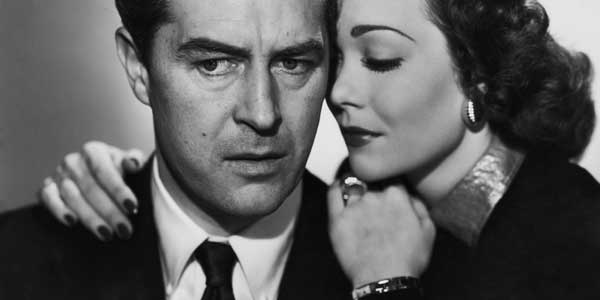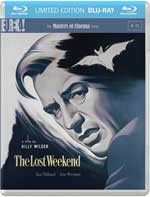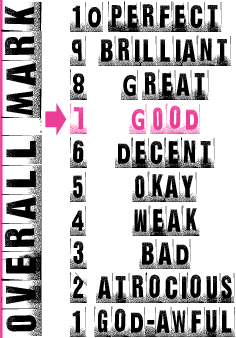
Director: Billy Wilder
Running Time: 96 mins
Certificate: PG
Release Date: June 25th, 2012

Back in 1945, vaguely realistic depictions of addiction on screen weren’t just a rarity, they were pretty much unheard of. However, coming off the success of Double Indemnity, writer-director Billy Wilder decided that the time was ripe to adapt Charles R. Jackson’s novel about alcoholism, The Lost Weekend, for the big screen. It certainly worked, as Wilder won Best Screenplay, Best Director and Best Picture Oscars for the movie.
Ray Milland plays Don Birnam, who’s supposed to be giving up the booze and heading off for the weekend with his straight-laced brother, Wick. However the lure of the liquor proves too much and Wick gives up on helping his brother, leaving Don’s girlfriend, Helen (Jane Wyman), to deal with him. This is the start of a four day binge, where Don’s desperation for alcohol becomes ever greater. He harbours ideas of being an author, but blames his alcoholism of writer’s block, and it’s gotten so bad he even hocks his typewriter to get more whiskey.
Things spiral ever downwards, with Don turning to crime, getting locked up in a hospital’s drunk ward and even contemplating suicide as he can’t see any way out. Don remembers the man he used to be but can’t see how to get back to that, especially when he starts having the dreaded hallucinations of the serious alcoholic.
Although there are plenty of tropes of film noir in The Lost Weekend, it’s really more akin to another staple of the 40s and 50s, the melodrama. Indeed it’s a bit of a problem, as it means it hasn’t aged as well as some other Wilder movies. It’s still a good film, but the melodrama does tend to make it seem a little overwrought. It’s also true that while The Lost Weekend was almost unique at the time for treating alcoholism seriously and giving people a sincere and grimy insight into the condition (there had been alcoholics on screen before, but they were generally either treated comically or were part of dreadful b-movies), it lacks that sense of breaking new ground it had in 1945.
However I’m certainly not saying it’s bad, as it’s still a very good movie. Ray Milland is very good as Don Birnam, particularly as the character descends ever further into the pit of alcoholism. There’s also plenty of Wilder’s incisive dialogue and his deceptively simple directing style takes you inside the characters and their plight.
The Lost Weekend is also an oddly important film in the history of gay cinema, not because of what it includes but what it misses out. In Charles R. Jackson’s novel, Don is haunted by a gay relationship in his youth and it’s strongly suggested he’s a latent homosexual and in serious denial. It’s his issues with this that are at the centre of his struggle with alcohol – as it was for many gay people at the time. However, with the Hay’s Code tightening its grip on Hollywood in the mid-1940s, any mention of ‘sexual perversion’ was banned, even if it was in a negative light (as it would have been here). As a result Don’s trauma becomes writer’s block, or at least the division between the artist he thinks he should be and the man he is. At first the drink numbs his pain, but soon it makes things worse, ensuring he can never be happy. Latent homosexuality in an era where being gay was illegal is a stronger logic than writer’s block, but Wilder’s hands were tied.
While the film is good but perhaps not as great as it seemed in 1945, the HD transfer is very sharp. The picture is crisp with great subtleties in the black and white picture. It looks extremely good, showing off just how good Wilder was at capturing images. However the real highlight of the disc, other than the film, is a three part 1992 Arena documentary, where German filmmaker Volker Schlondorff interviews Wilder about the breadth of his career. With three hours of footage and Wilder giving an amazing insight into his films and the way he worked, it’s a bit of a must-see for fans of classic film and the director of Sunset Boulevard and Some Like It Hot. With several other good features, it’s a great selection.
Overall Verdict: Although some The Lost Weekend’s power has been dulled by time, this Best Picture winner is still an absorbing character study of alcoholism, given a great Blu-ray release.
Reviewer: Tim Isaac





Leave a Reply (if comment does not appear immediately, it may have been held for moderation)